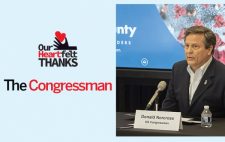While health leaders didn’t expect a deadly pandemic to hit in 2020, they weren’t surprised either.
“We’ve been preparing for years,” says Caryelle Lasher, public health coordinator for Camden County. “We’ve watched global travel and the way viruses evolve and spread.
We knew it was only a matter of time. We didn’t expect it right now, but we weren’t as unprepared as you’d think.”
At the county’s chemical disease unit, which Lasher oversees, it’s been all-hands-on-deck. The team has been conducting COVID-19 contact tracing (a series of interviews to determine who else may be at risk of exposure), coordinating community resources and gathering information. The data they collect helps officials make decisions that affect the lives of SJ residents, like what geographic areas are hardest hit, and whether interventions to control the virus’s spread are effective.
Any COVID-positive case triggers an immediate reaction: isolate the patient and begin contact tracing. It seems straight-forward in theory. In practice, not so much.
“There are days when we’re just sad,” says Lasher, who must ask lots of questions about people who are sick, sometimes critically ill, or may have died from the virus. “It takes a lot of patience and compassion. We’re working with people at a very scary time. We’re offering support to help people stay safe, but emotionally it’s taxing.”
Lasher and her team have ramped up every resource the county has to offer – mental health services, access to home-delivered meals and state aid. They also arrange for people who have tested positive to stay in hotels if they can’t isolate where they live. But some things are out of their hands.
“The lack of resources like PPE and ventilators has been a bigger surprise than the outbreak itself,” she says. “We quickly saw the cracks in the public health system, and we know we need to close them before we hit a second or even third wave.”
Her main takeaway: Be smart. Emotions run high, but through it all, she sticks to the data.
“In crisis, it’s natural to go with our gut feelings and ignore facts,” she says. “People may not want to listen, but data is the best way to help the people in charge make the right decisions.”













